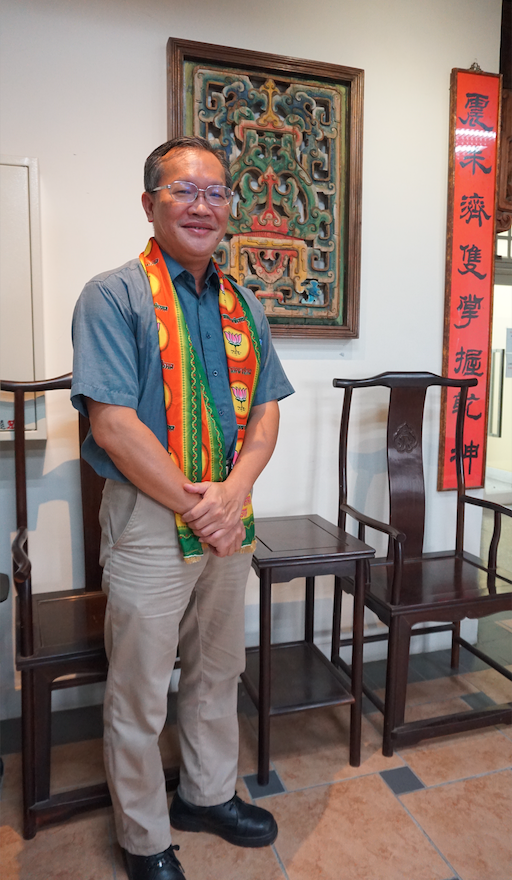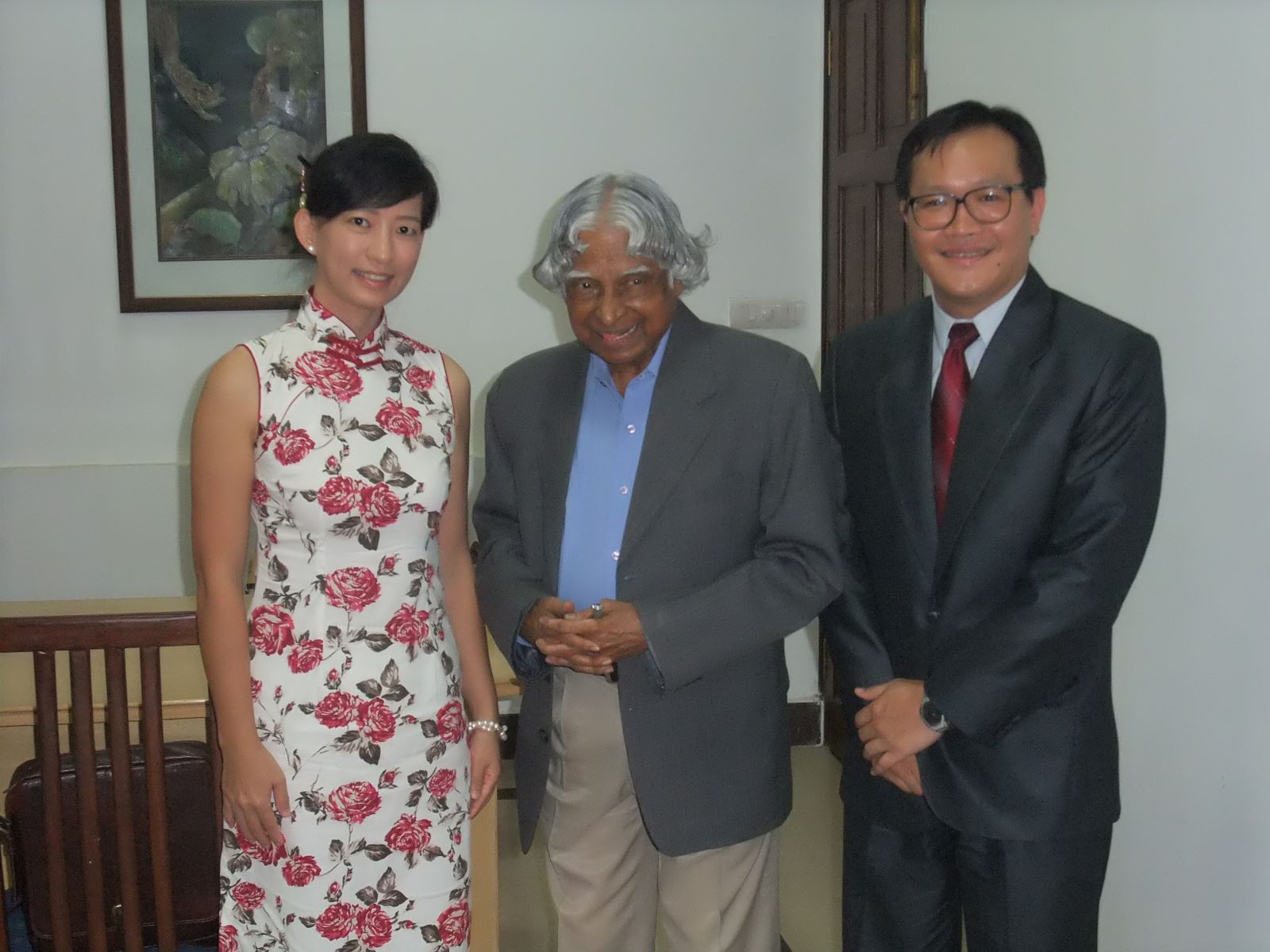Director’s Notebook
Fate works in mysterious ways. Before I interviewed Fang Tien-Sze, I had this feeling that I’d already crossed paths with him somewhere before. Then it suddenly came to me that I’d interviewed Fang’s wife Yuli Tung, the first Taiwanese doctoral recipient of Jawaharlal Nehru University, many times before! When I interviewed Dr. Tung, she told me moving anecdotes about her six years as a married couple living in India, which painted a better picture of a Taiwanese diplomat’s professional life. After making this connection, I had a clearer understanding of the sincerity behind Fang’s hope to strengthen Taiwan-India relations.
Urging Taiwanese to Keep an Open Mind Towards India
As soon as the Indian film Gangubai Kathiawadi was released, it became one of the biggest hits on Netflix. However, according to Fang Tien-Sze, Deputy Director of National Tsing Hua University Center for India Studies and Chairman of the Taiwan-India Association, most Taiwanese didn’t appreciate the film because the public lacks an understanding of Indian culture. Professor Fang told me about conversations he had with Indian journalists. He told them that if you’re in Taiwan and search “India” on the internet, the top hit will most likely be Abhigya Anand, a famous young man who’s known for making accurate predictions regarding world events.
Relative to other Southeast Asian countries, Taiwanese tend to focus more on trade and Indo-Pacific strategy with India or hold perceptions that tend to be a touch negative, narrow minded, or bias. As a former diplomat stationed in India, Fang said the crux of the issue is “regardless of whether you’re in business, government, academia, or just visiting, don’t think you’ll know how things work in India just because you’ve spent time in China or Southeast Asia.” For example, Professor Fang Tien-Sze said the way Taiwanese conduct business in China doesn’t work in India. Academics might find themselves with smoke coming out of their ears if they go to India and try to copy paste their experiences from Southeast Asia. However, in these instances, Fang urges Taiwanese to ask themselves if they are doing enough to adapt to how things are done in India. Afterall, Taiwan is different than India when it comes to language, culture, religion, customs, and a rigid caste system. Fang suggests that when going to India for professional reasons, Taiwanese might not be able to “do” as the Indians do, but at least they can “ask” how the Indians do. Once a senior Indian diplomat told Fang, “All foreigners and Indians are treated the same in the sense that whoever stays in business the longest eventually comes out on top.”

Picture 1: Professor Fang Always Says India Is a Prime Example of a Place that Puts People First (Photo Courtesy of Pei Lin-lin)
Taiwan and India Thrive throughout the Pandemic Due to Steadfast Connection
“Can you imagine a MacDonald’s without pork McMuffins for breakfast, or Big Macs for lunch.?” The bestsellers at MacDonald’s in India are their chicken, fish, and veggie burgers because Hindus don’t eat beef and Muslims won’t have anything to do with pork. Despite this, sales are strong, and people say that India has “the most unique MacDonald’s in the world.”
Professor Fang brought up the previous example because he hopes to change Taiwanese attitudes towards Indians on both a microlevel, for things like food, clothing, and customs, and on a macrolevel for big concepts such as trade and Indo-Pacific strategy. McDonald’s was able to gain access to a huge market because they properly understood local religion and dietary customs and shifted their menu to chicken, fish, and vegetarian options accordingly. In the same vein, the Taiwanese business community is also interested in learning about India. Through this process, Taiwanese can learn to move away from thinking they have everything figured out and being constrained by their own opinions. For Fang, letting go of preconceptions is the only way to truly gain a global perspective while learning how to adapt to local customs.
In 2020, Fang Tien-Sze launched the “Building the Taiwan-India academic chain: Empowerment of India studies community and Cross-border exchanges” project with support from the National Science and Technology Council (NSTC) (called the Ministry of Science and Technology at the time). Even though the project was launched during the Covid-19 pandemic, it adapted by going digital and hosting lectures, seminars, book clubs, and workshops through the internet. The lectures held during the project touched on a wide variety of topics such as “Understanding India’s Rise through Bollywood,” “The Tapestry of Indian Culture,” and “Examining the Complexities Behind Women’s Issues in India.” The nearly 50 successful events of all sizes helped groups of up to 100 participants cultivate a deeper understanding of Indian culture. Currently, Fang’s devotees are eagerly anticipating his visit to schools and thinktanks in India to conduct meaningful in-person exchanges this November.
Want to Expand Business in India? Start by Establishing India Studies Programs in Taiwan
Even though his events had impressive results, Fang hopes that Taiwan and India can conduct more exchanges in the future. Professor Fang said, “According to Taiwan External Trade Development Council statistics, Taiwan has over 25,000 people doing business in Southeast Asia. But in India, there are only 100, and this figure includes big companies such as China Airlines, Evergreen, and Delta Electronics!”
From the perspective of international and regional strategic planning, many countries started sending their manufacturing orders to India before the pandemic. As the pandemic starts easing up, tech companies now want Professor Fang and the Tsing Hua University Center for India Studies to help them understand how to make sound investments in India by learning more about the management talent found in Taiwan and India.
“Despite this, Taiwan doesn’t have one university with an India Studies major!” Professor Fang stated that Taiwan needs to update its academic “map” with at least one sorely needed India Studies program in order to forge stronger bilateral academic, political, economic and strategic ties. Whether it’s big tech companies in Hsinchu needing to send employees to India, or transnational corporations wanting to understand the differences in the ways Taiwanese and Indians think and behave, Taiwan would have plenty of talented individuals to fill gaps in the private sector if it had an India Studies program. Tsing Hua University, which currently has the most Indian master’s and PhD students in Taiwan, has already used its International Intercollegiate MS Program to launch India Studies courses. In addition, Tsing Hua University has also petitioned the Ministry of Education to set up in-service education programs to facilitate industry-academia integration. However, Taiwan must also do one of two things if it wants to avoid repeating past business development blunders. First, Taiwan should send management-level individuals abroad that understand India to search for solutions, or second, encourage Indians studying in Taiwan to act as a bridge between industry, government, academia, and research after returning home.
Standing on the Shoulders of Giants – Promoting Taiwan-India Exchange as Husband and Wife
As I was interviewing Professor Fang, I noticed someone who looked familiar on a poster that he’d put up in his office. It turned out to be Yuli Tung, a woman that I’d interviewed several times before. Professor Fang smiled and said, “I had no choice but to team up with my wife. Finding people willing to promote India in Taiwan and help me establish the Taiwan-India Association was nearly impossible.”
Back in 2005, Professor Fang was posted to India for 6 years. Fang’s wife, someone who loves learning as much as Indian culture, took the opportunity to continue her studies and became Jawaharlal Nehru University’s first ever Taiwanese PhD student. The couple now sees their work as a public service. They make sure that one of them is available whenever media outlets such as Public Television Service, Da Ai Television, or Hakka TV need commentary on Indian affairs. The couple hopes to help Taiwanese have a more nuanced understanding of India by sharing their experience and knowledge.

Picture 2: Professor Fang and Yuli Tung with former Indian President Karan Singh (Photo Courtesy of Fang Tien-Sze)
Professor Fang lit up when saying that everyone knows that now is the opportune moment to bring in the New Southbound’s “people-centric” approach to Taiwan-India relations. If Taiwan wants to stand on the shoulders of giants, it must start from education to create a partnership based on mutual understanding as India transforms into an economic and political powerhouse.
Columnist
.png) Pei-lin Lin
Pei-lin Lin
Pei-lin Lin obtained her B.A. in Philosophy from Fu Jen University and her M.A in Political Science from National Taiwan University. Lin embodies a humanistic literacy and political sensibility. In recent years, Lin has collaborated with the Taiwanese government to shoot videos promoting various policies. Currently, Lin splits her time between running a Chan Lands Ltd., Zongdipan, making documentary films and hosting the podcast “Human Translation Machine.” In the past, Lin has been a reporter for several media outlets and the anchor of shows on TVBS, CBC and Da Ai Television. While at Da Ai Television, Lin’s piece “Muhammad Yunus- Savior of the Poor,” was nominated at the First Taiwan Golden Wheel Awards for Outstanding Television News Feature.